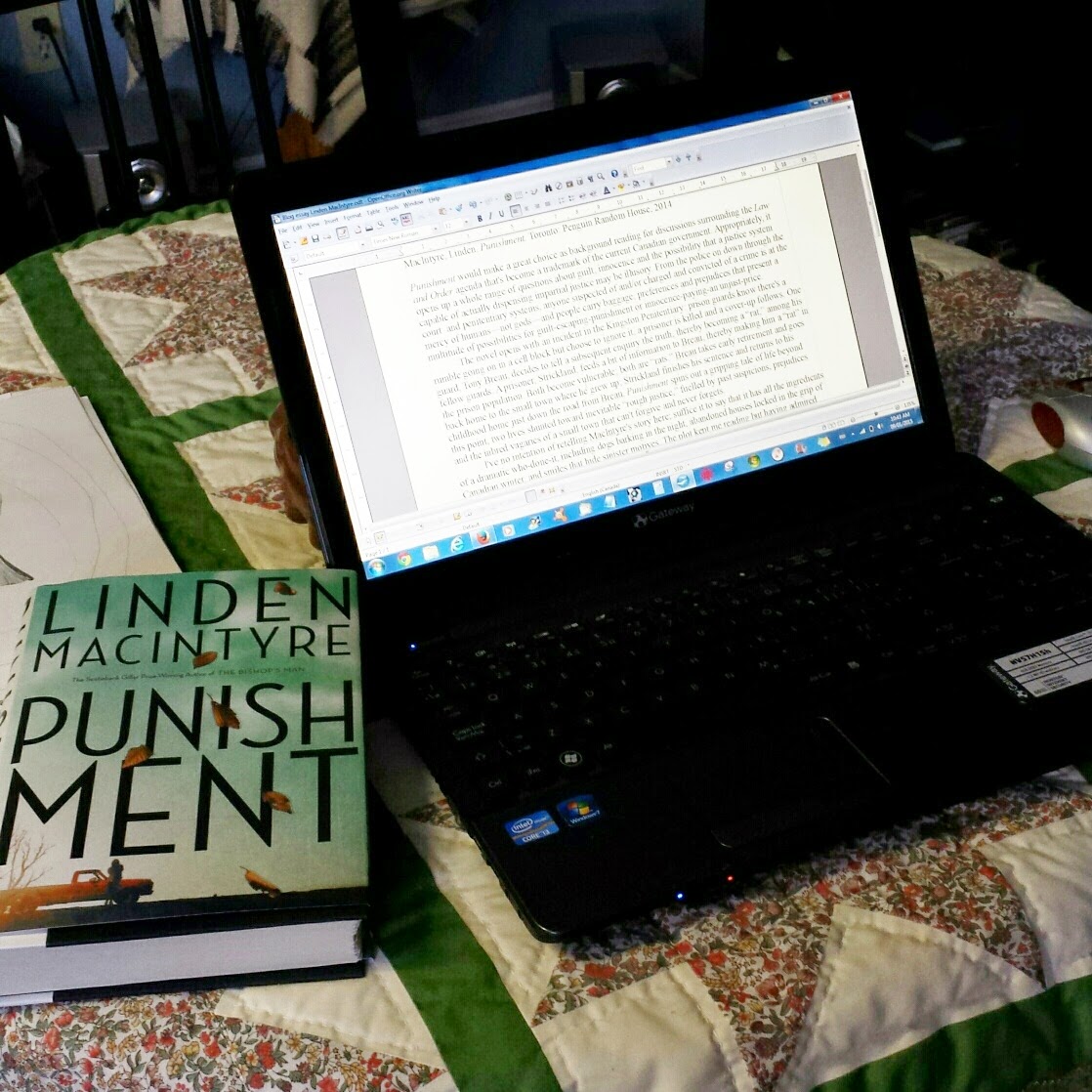 |
| Punishment |
MacIntyre, Linden. Punishment.
Toronto: Penguin Random House,
2014
Punishment
would make a great choice as background reading for discussions
surrounding the Law and Order
agenda that's become a trademark of the current Canadian government.
Appropriately, it opens up a whole range of questions about guilt,
innocence and the possibility that a justice system capable of
actually dispensing impartial justice may be illusory. From the
police on down through the court and penitentiary systems, anyone
suspected of and/or charged and convicted of a crime is at the mercy
of humans—not gods—and people carry baggage, preferences and
prejudices that present a multitude of possibilities for
guilt-escaping-punishment or innocence-paying-an unjust-price.
The novel opens
with an incident in the Kingston Penitentiary: prison guards know
there's a rumble going on in a cell block but choose to ignore it, a
prisoner is killed and a cover-up follows. One guard, Tony Breau,
decides to tell a subsequent enquiry the truth, thereby becoming a
“rat,” among his fellow guards. A prisoner, Strickland, feeds a
bit of information to Breau, thereby making him a “rat” in the
prison population. Both become vulnerable; both are “rats.” Breau
takes early retirement and goes back home to the small town where he
grew up; Strickland finishes his sentence and returns to his
childhood home just down the road from Breau.
Punishment spins
out a gripping tale of life beyond this point, two lives shunted
toward inevitable “rough justice,” fueled by past suspicions,
prejudices and the inbred vagaries of a small town that can't forgive
and never forgets.
I've no intention
of retelling MacIntyre's story here; suffice it to say that it has
all the ingredients of a dramatic who-done-it, including dogs barking
in the night, isolated houses locked in the grip of Canadian winter,
and smiles that hide sinister motives. The plot kept me reading but
having admired Linden MacIntyre's investigative journalistic talents
on CBC's Fifth Estate for many years, I kept thinking: “what
were the occasions and the nature of the research behind this plot,
these characters?”
MacIntyre's book
dedication provides one clue: In memory of Ernie Hayes, AKA Tyrone
W. Conn, 1967 – 1999. I wasn't aware that MacIntyre and Fifth
Estate producer, Theresa Burke, had written a book in 2002—Who
killed Ty Conn—about the life and death of an
habitually-incarcerated offender. Their hope was that given Conn's
history of abuse and neglect in childhood and youth, the book would
provide insight for dealing with juvenile offenders in a more
empathetic manner than was the case with Conn. Quite likely,
MacIntyre had memories of that book and his personal knowledge of Ty
Conn in his mind when he created the character Strickland. Readers of
this latest novel will want to check out the story of MacIntyre's and
Burke's experiences with Conn leading to the writing of the earlier
book by clicking here.
But Strickland's
story is a subplot, a sub-theme in Punishment. Tony Breau's
life, like Strickland's, is complicated, including early adoption
into a community of strangers, made-and-lost relationships and the
very human longing for a comfortable place to be in a broken world.
Broken cultures produce broken children who grow up to be broken
adults; our justice and penal systems will always be overwhelmed with
a responsibility for fixing the same brokenness that the system has
caused. What we can do—and do do—is punish; what we are
ill-equipped to effect is prevention.
But
it's not necessary to deal with global issues to be absorbed by
MacIntyre's novel. Like all good novels it stands on its own as a
tale of human struggle, defeat and survival—with enough of hope and
redemption to balance the trials that are—in the end—the
inescapable conditions of human life. I had flashbacks to another,
older novel exploring similar themes to Punishment:
Dostoyevsky's Crime and Punishment
specifically. The guilt of Rodion Raskolnikov and that of Tony
Breau bear similarities, but guilt
is never black on white; guilt has precedents, deviance happens in an
environment, human perceptions of events are partial, often foggy,
and the response to deviance is driven by prejudice and rage as often
as by cool rationality.
Besides
his work on Fifth Estate,
Linden MacIntyre is probably best known for his novel, The
Bishop's Man. It was awarded the
2009 Scotiabank
Giller Prize and the Canadian Booksellers Association's Fiction
Book of the Year.